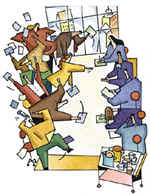
As professional association managers, we have all been asked at one time or another why we enjoy this sometimes crazy business we are in.
It is certainly much easier to manage rental and commercial office buildings than community associations, if for no other reason than, in rental, if a tenant does not wish to abide by the rules, they can be asked to leave. We do not necessarily have to influence them to do it our way. As Ken Schatz says in his book, "Managing By Influence", (1994), it is easy to manage by authority but much more difficult to manage by influence. The results, however, are more effective when managed by influence. To effectively deal with difficult people, consider: (1) Why are people difficult? (2) How to determine what is really bothering the person? (3) What are practical methods of handling difficult people?
Why are people difficult?
There are many reasons why people are difficult at one time or another. We all know that some people are naturally disagreeable and have never been able to adjust from that behavior. We cannot pretend to interact effectively with these folks because their attitude prevents us from dealing with them in a effective manner. However, many of us experience difficult times due to variety of valid reasons, while at other times, the reasons may seem petty. The underlying reasons for an unreasonably demanding attitude may be related to job stress, home stress, traffic, lack of understanding, you-versus-them syndrome, having a hidden agenda and even, poor service.
From the perspective of the Board of Directors, a lack of demonstrated leadership can cause and encourage confusion, conflict, and intolerance. On the lighter side, but still applicable, blame can be placed on the weather, lunar movements, football losses, or having teenage children! As a leader, being aware of these human frailties in yourself as well as others will go a long way in dealing with the individual who is being difficult.
Finding out what is really bothering someone

In my opinion, the most difficult part of working with this issue is trying to identify what the problem is so that you can find ways to solve it. Each individual is different and, in my case, having the patience to delve into the problem is an area I focus on in order to be more effective. The first requirement is to be a good listener. In my experience I found that a difficult person is often someone who wants attention. This does not necessarily mean they do not have a valid issue. However, their demanding approach discourages others from wanting to explore the issue further so that assistance can be provided to them. Being a good listener requires patience, focus, and understanding. Lacking these qualities could cause failure in determining what is genuinely bothering someone. If you are successful in being a good listener, you can often use your influence to create a calming climate and eventually have a non-emotional discussion. Encouraging an individual to discuss their issue(s) without being condescending or judgmental will go a long way in your ability to narrow down the issues and subsequently find a solution. I have found that when an individual believes you are sincerely trying to solve his/her problem, that person will respond positively, even though the solution may not have been what they expected.
What are practical methods of handling difficult people?
As leaders, we all know that when conducting meetings we can use (or hide behind, if you wish) Roberts Rules of Order and instill a certain amount of control the legal way. This may not always be in the best interest of the group you are representing, and in fact, can destroy the relationship you have nurtured over time. When evaluating practical methods of handling difficult people, the first and foremost thing to consider: what is right for this situation. If you lose integrity with this person, the next time you deal with a difficult person will prove to be two or three times harder. Maintaining flexibility, having an open mind on problem solving, as well as positive thinking are all extremely important. People respond favorably and with a cooperative attitude when you offer a positive perspective and give them the enthusiastic impression of "Yes, we can solve this together." When individuals are difficult and present you with a problem, ask them "Do you have a recommended solution?" Whenever possible, make the person a part of the solution, influence them to "own" the solution and to take credit for it.
Often, we are dealing with difficult people within community associations in a group setting. This usually occurs at Board, Committee, or Annual meetings. Planning a well thought-out agenda, with appropriate structure, provides the proper vehicle for a successful meeting. Many times if meetings are conducted with a good structure, it is easier to deal with difficult people. Having periodic Town Meetings with a formal agenda, which includes answers to often asked questions along with a resident forum to vent concerns and obtain answers, will also go a long way in helping you deal with aggressive individuals.
Finally, communicate with your fellow owners and residents on a consistent basis using a communication vehicle such as a newsletter and website. These tools can provide answers sought out by difficult people and encourage them to a conclusion that being difficult is harder and less productive than being a positive and satisfied person.
A full comprehension by YOU that one of the major reasons you are in this business either professionally or as a volunteer, is the fact that you genuinely like dealing with people and PROJECTING this attitude in everything you do will make you successful in DEALING WITH DIFFICULT PEOPLE.
 Print
Print Email
Email







